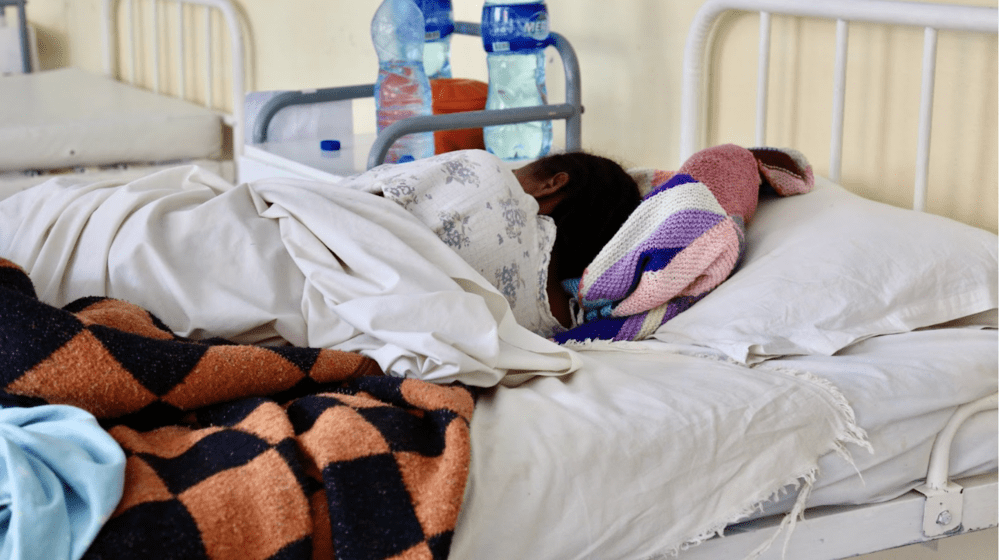MEKELLE, Tigray - “When health workers returned to work after the conflict, I was referred to Hamlin Fistula Center. Here, I am recovering from my depression and I have started to sleep for about two hours a day”, says Mebrat, a survivor of obstetric fistula from Rama, the northern part of Tigray, Ethiopia.
Mebrat was nine months pregnant when conflict erupted in her village in November 2020. While people were fleeing their homes and armed forces were setting up blockades, she went into labour. On the fourth day, her mother decided to take her to a nearby health center taking the risk of being caught in the crossfire. When they arrived, all health professionals had fled and the two remaining health workers were on their way to leave. Amidst all challenges, they helped her to deliver but the baby was dead. She was devastated.
In the following days, Mebrat noticed something was wrong. “I was not able to control my urine and faeces,” she says from her hospital bed. She had never heard of fistula and accessing healthcare was not possible until ten months later during a cessation of hostilities. It was then when services resumed at the health center that she was able to understand her condition. Nowadays, she is still recovering at Hamlin Fistula Center in Mekelle.
A traumatic injury
Mebrat’s story is not uncommon. Obstetric fistula is almost entirely preventable, yet it continues to happen, largely among the world’s most marginalized, impoverished women and girls. During crises, the risks factors for fistula increased exponentially as a result of obstructed labour due to limited or absent maternal care services, and conflict-related sexual violence.
Each year between 50 000 to 100 000 women worldwide are affected by obstetric fistula, and in 90 per cent of cases the newborn does not survive.
“The toll of the injury is devastating. Women and girls with obstetric fistulas may face other physical problems, including frequent infections. They are often shunned, unable to work or go to school, and driven deeper into social exclusion and poverty”, says Eden Alem, UNFPA Sexual and Reproductive Health Analyst.
In Tigray, access to maternal and newborn health services to treat fistula were severely compromised during active conflict as a result of limited functional health facilities, shortage of medicines, staff and the breakdown of referral systems. Following the peace agreement, access to health services are gradually being restored across the region.
Building back hope for fistula survivors
Yet preventable, obstetric fistula is among the most serious and distressing maternal morbidities. Across Ethiopia, UNFPA is working with partners to support efforts to end fistula by deploying over 212 midwives to deliver emergency obstetric care in facilities where there are staff shortages. In 2023, midwives provided more than 240,000 sexual and reproductive health services across affected regions, including maternal and newborn health care. Additionally, more than 200 metric tons of reproductive health supplies and equipment, including lifesaving maternal health medicines, have been delivered to hospitals, health centers and mobile clinics to support safe births.
In Tigray, Mebrat is one of the survivors that UNFPA is supporting - through a partnership with Mums for Mums and Hamlin Fistula Center - with essential treatment and repair surgeries, with funding from Global Affairs Canada.
Yet, much more remains to be done to uphold women and girl’s rights to maternal and newborn care and end fistula by 2030.
The UNFPA Humanitarian Response Appeal 2023 is calling for nearly USD 45 million to respond to the protection and health needs of women and girls across crisis-affected regions in Ethiopia. Women like Mebrat need our support. To date, only half of UNFPA’s humanitarian appeal has been funded.
After an agonizing experience, Mebrat feels grateful for the care received and holds hope for her prompt recovery and future - “I want to work with the women in my community to advocate for safe motherhood. No woman should endure what I have been through”.
*Name changed for confidentiality and privacy reasons.


